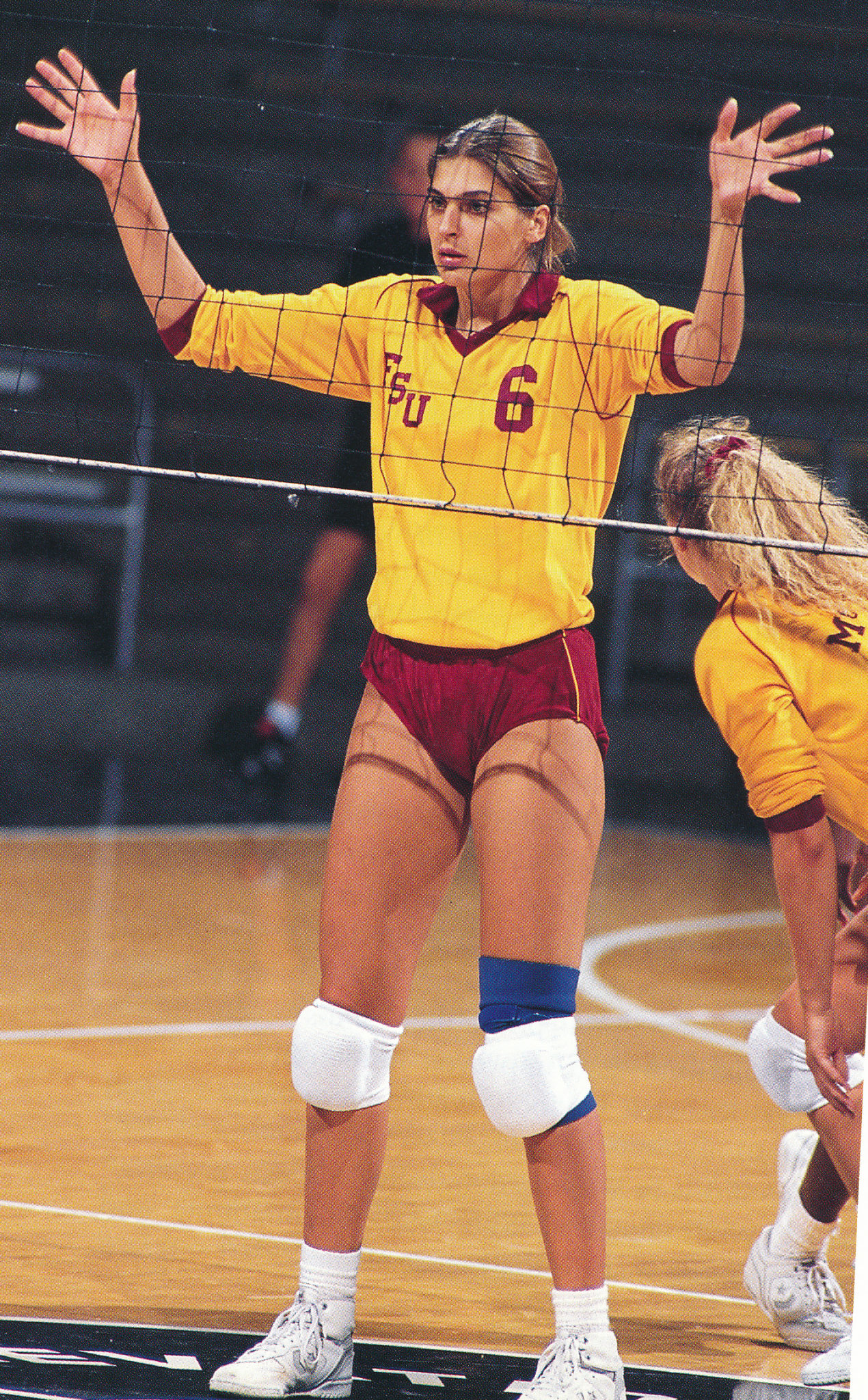
Gabrielle Reece
By Kerry Dunning
Winter, 2018
 |
Gabrielle Reece |
Gabrielle Reece is an athlete and feminine. She is a business woman and kind. She is a former professional volleyball player, a beach volleyball champion, a model, an actress, an author, a sports announcer, a wife and a mother.
And Reece is the latest Florida State athlete to have a jersey number retired.
“If you can hold the line, keep trying to do the work, grow and learn, you show up for your job, and you are trying to take pride in what you do, I think it is the last man standing,” said Reece, a message she passed on to both the volleyball and beach volleyball squads on the day her No. 6 was displayed in the rafters at Tully Gym. “I’m honored certainly but what I’ve done for Florida State is nowhere near what Florida State has done for me.”
Reece didn’t start playing the sport until her junior year of high school. Credit coach Cecile Reynaud for discovering Reece before she was noticed on the recruiting trail.
“I wasn’t really looking for anybody except for the next year, but I walked into this gym in Tampa and I went up to talk with her,” said Reynaud, who said it wasn’t hard to notice the 6-foot-3 Reece. “Then, after she signed, she started getting recruited because people saw her playing.”
 |
Cecile Reynaud |
It came that close to not having Reece on campus. “I met Cecile and I realized that she might tell me the truth and that was important. It was also just right for everything I wanted. It was still in Florida but far enough away. And it was a great athletic program.”
Reece adds, “When you realize the legacy here and that the locals have always come to support us in Tully, I think the gods had a hand in it, quite frankly.”
Reece holds two school records in solo blocks (240) and total blocks (747), which have stood since 1989. But it wasn’t just her athleticism that caught attention. Name any other college athlete that went to New York City every spring for a modeling career?
“She was so heavily pursued in the modeling business that we couldn’t keep her on campus,” says Reynaud. “So she would take off, go around the world and then come back to take summer classes to keep her eligibility.”
Reynaud tells the story of her agents coming to Tallahassee to watch a volleyball match, and Reece was hit in the face and bloodied. She looked over at the shocked women at the same time Gabby was asking to go back on the court.
“She had a good time, but then she really developed her own career,” said Reynaud. “Being a model was nice, but it wasn’t going to keep her engaged.”
So after a couple of years on the pro volleyball tour, Reece’s four-person team captured first place in the Beach Volleyball World Championships.
“When I look back on things, I realize that life is about timing and, you know, I didn’t really want to pursue indoor in Europe so really the only other option was beach (volleyball),” she said. “It was still a relatively small community and it also prolonged my ability to play.”
What frustrates Reece is exactly where she has made an indelible mark on a multi-level career path.
“You still have to find a way to make athletics a real business. Even though it is sports stuff, you can’t do it the same way as men,” Reece said. “Where men are about statistics, I think people are interested in the different dimensions of the female athlete. So it is something I have always worked on and been a part of how do you promote women’s athletics in the way that actually brings the right attention rather than doing it exactly like the men do it.”
Reece smiles when she says her husband, Laird Hamilton, always jokes about “the clothing and how many options you have.” While she no longer models as a primary business line, she added, “I’ve always thought it was a benefit to be a female, and a female athlete, because you could go and play and be rough, and then you could come out and enjoy things about being female.”
 |
Reece’s jersey retirement is part of the year-long celebration of 50 years of women’s intercollegiate sports at FSU. She has seen a lot of change in being a female athlete.
“For me, the novelty is not there anymore. Meaning when we were playing it was ‘Oh, you play sports.’ Where young women now it is special to play sports but the novelty of women’s sports vs. men’s sports has obviously changed,” Reece said. “What was interesting for me, it was 19 years after Title IX when I went to college on a full scholarship. That group changed it. To see Florida State, now watching beach volleyball, their programs getting stronger, and all the championships, it is watching every program pick up steam. They have great coaches and great athletes.”
She thinks about her three daughters as she says, “Women are a lot of people. We are teaching young women that if you want to get sweaty and kick butt or if you want to be a scholar or anything else matters, you have the freedom to do anything for all the people within ourselves.”
Reece concludes, “The fight is to embrace it. It’s empowering. When you see loving and kind and strong, that is empowering women to be three-dimensional.”